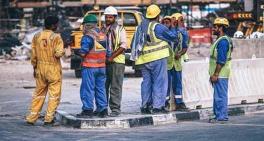International Criminal Court to probe abuses in Venezuela
Court Watch
The International Criminal Court is opening a formal investigation into allegations of torture and extrajudicial killings committed by Venezuelan security forces under President Nicolás Maduro’s rule, the first time a country in Latin America is facing scrutiny for possible crimes against humanity from the court.
The opening of the probe was announced Wednesday by ICC Chief Prosecutor Karim Khan at the end of a three-day trip to Caracas.
Standing alongside Maduro, Khan said he was aware of the political “fault lines” and “geopolitical divisions” that exist in Venezuela. But he said his job was to uphold the principles of legality and the rule of law, not settle scores.
“I ask everybody now, as we move forward to this new stage, to give my office the space to do its work,” he said. “I will take a dim view of any efforts to politicize the independent work of my office.”
While Khan didn’t outline the scope of the ICC’s investigation, it follows a lengthy preliminary probe started in February 2018 — later backed by Canada and five Latin American governments opposed to Maduro — that focused on allegations of excessive force, arbitrary detention and torture by security forces during a crackdown on antigovernment protests in 2017.
Human rights groups and the U.S.-backed opposition immediately celebrated the decision. Since its creation two decades ago, the ICC has mostly focused on atrocities committed in Africa.
“This is a turning point,” said Jose Miguel Vivanco, the Americas director for Human Rights Watch. “Not only does it provide hope to the many victims of Maduro’s government but it also is a reality check that Maduro himself could be held accountable for crimes committed by his security forces and others with total impunity in the name of the Bolivarian revolution.”
It could be years before any criminal charges are presented as part of the ICC’s investigation.
Maduro said he disagreed with Khan’s criteria in choosing to open the probe. But he expressed optimism that a three-page “letter of understanding” he signed with the prosecutor that would allow Venezuelan authorities to carry out their own proceedings in search of justice, something allowed under the Rome statute that created the ICC.
Related listings
-
Order: Mississippi judges have discretion for COVID safety
Court Watch 08/07/2021Mississippi judges have the power to delay trials, limit the number of spectators in courtrooms or take other steps to try to slow the spread of COVID-19, the leader of the state Supreme Court says in an emergency order. Chief Justice Michael Randolp...
-
Court upholds ban on in-person church services in California
Court Watch 05/24/2020An appeals court has upheld California Gov. Gavin Newsom’s ban on in-person church services amid the coronavirus pandemic, in a split ruling that found that government’s emergency powers override what in normal times would be fundamental ...
-
Court to consider bathroom use by transgender student
Court Watch 11/24/2019A transgender student’s fight over school bathrooms comes before a federal appeals court Thursday, setting the stage for a groundbreaking ruling.The 11th U.S. Circuit Court of Appeals in Atlanta will hear arguments about whether a Florida schoo...

Thai National Sentenced, Faces Deportation for Operating Immigration Fraud Scheme
Nimon Naphaeng, 36, a native and citizen of Thailand, who resided in Wakefield, R.I., was sentenced Monday to 27 months in federal prison for running an immigration fraud scheme that defrauded more than 320 individuals, most of them immigrants, of at least $400,000, and perhaps more than $518,000.
The scheme included the unauthorized filing of false asylum applications on behalf of individuals who did not request, nor authorize, the applications.
“U.S. Citizenship and Immigration Services does not tolerate immigration fraud of any kind,” said Susan Raufer, director of the USCIS Newark Asylum Office. “We are proud of our role in uncovering this fraud scheme and bringing the perpetrator to justice.”
At sentencing, U.S. District Court Chief Judge William E. Smith ordered a provisional amount of restitution of $400,000. The final amount of restitution will be determined subject to additional victims being identified and additional court filings over the next 90 days. According to court documents already filed by the government, restitution in this matter may exceed $518,300. During the investigation, the government seized $285,789.31 from Naphaeng. The forfeited funds will be applied toward restitution for victims of Naphaeng’s crimes.




